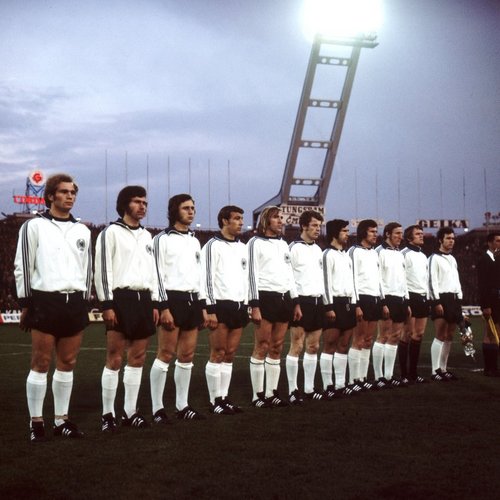
Maier, Beckenbauer, Breitner, Höttges, Vogts, Bonhof, Hoeneß, Köppel, Netzer, Mueller, Wimmer – part of the 1972 Euro winning team
One of the unfortunate consequences of the success of the 1998 Les Bleus was the far right rejection of the team.
Jean Marie Le Pen and the National Front openly questioned what was “Gallic” about the team. In Zidane, Thuram, and Makelele, they saw a rejection of nativist prinicples. Success had a way of leavening these fault lines but the 2010 debacle have seen these misgivings come back to the forefront.
Alain Finkielkraut, an influential thinker in far right circles equated the disaster as a portend of a France more vested in ethnic and religious divisions rather than a national character. The fabric of the country was being undermined by the generation of the caillera.
These sentiments are being echoed by German supremacists over the Mannschaft. With a multi-cultural hue and names like Oezil, Khedira, Cacau, Boateng, and Aogo supplanting traditional names like Schweinsteiger and Lahm. There is angst and fear at the loss of national identity. A feeling that the country is slipping away from right underneath them.
As this article by Der Spiegel points out Neo-Nazis hate this new team “because it totally disturbs their entire world view,” which is based on ethnic purity and not on democratic principles. One far right website thundered:
“The squad is not a German national team and those people with dark complexions are the Federal Republic of Germany, but they are not Germany. Not tall and blond, but black, brown, puny and Muslim. What progress!”
In neighbouring Switzerland, a country whose immigration demographics closely mirror Germany- the national team already sports players like Eren Derdiyok and Gokhan Inler. The future of Swiss football have been brightened by immigrants who made up the majority of the U17 team that won the World Cup with unfamiliar names like Ben Khalifa, Seferovic, Pajtami, and Kofi Nimeley. In four years, there maybe far fewer Swiss names in the national ranks.
Soccer maybe an acceptable outlet for the new Switzerland as long as it brings success but it is also a country that wants to do away with the overt symbols of what is considered undesirable and less “Swiss” in that immigration. Far right activists within the Swiss People’s Party were successful in mobilizing support to ban minarets.
“The minaret is a symbol of a political and aggressive Islam. The minute you have minarets in Europe it means Islam will have taken over.”
A common perception of the German teams of the past was of a “Teutonic” spirit that never gave up. Gary Lineker summed it up: “Soccer is a game for 22 people that run around, play the ball … and in the end Germany always wins.” No matter how boring, untalented the team, or whether the other team were two goals up – it was axiomatic, the Germans were never going to go away.
This may change with Germany not having won a significant title since the 1990 World Cup1996 Euro. The DFB have actively wooed migrant talent and expedited naturalization requirements. Cacau is a prime example.
The Mannschaft with the immense talents of a team with migrant backgounds like Oezil, Khedira, Cacau, Klose, and Podolksi perfectly complementing more ethnic German team mates like Schweinsteiger and Mueller won the world with their samba style soccer as they blistered their way through to the semi-finals giving no quarter to England and Argentina. But against Spain, they surrendered meekly. It was strange to see a German team so deferential, letting Spain roam without so much as a tackle.
The present Mannschaft may have been embraced by the rest of the world but their country might be more grudgingly disposed to them with attention paid to to who is singing “Deutschlandlied”. Only Klose amongst those players with a migrant background passed the smell test. “Fee Fi Fo Fum, I smell the blood of a German man” maybe the rallying cry of the far right but it could also poison the feel good story of the Mannschaft if they stop producing meaningful results.
For many not invested in anything other than good football, the new German brand is an antidote to all that “efficiency.” For others less forgiving, this maybe a sign that the “golden years of German football” have gone by.
2 comments on “Mannschaft: The right wing rejection”





“This may change with Germany not having won a significant title since the 1990 World Cup”
Euro 96?
Nafjan- thanks. Correction made. The German record of futility is not quite that of England.